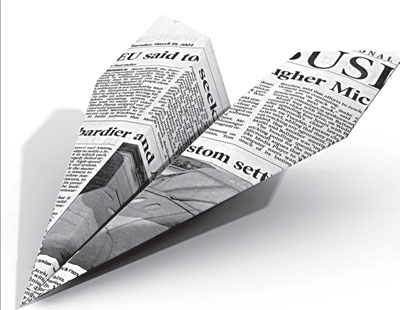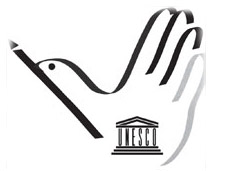Today is World Press
Freedom Day:
Power of the Fourth Estate
Aditha DISSANAYAKE
In May 1789, Louis XVI summoned to Versailles a full meeting of the
"Estates General", writes Jeffery Archer in his novel "The Fourth
Estate". "The first Estate consisted of three hundred nobles. The second
Estate, three hundred clergy. The Third Estate, six hundred commoners.
Some years later, after the French Revolution, Edmund Burke, looking up
at the Press Gallery of the House of Commons said, "Yonder sits the
Fourth Estate, and they are more important than them all".
 Today,
the fourth estate is the public press, referred to as a collective,
encompassing photographers, journalists, television broadcasters, and
radio announcers. Today, in view of the dynamics of communications
technology - we speak of "freedom of communication": an expression that
refers to every person's right to exercise both the freedom of
expression and the freedom to access information. Today,
the fourth estate is the public press, referred to as a collective,
encompassing photographers, journalists, television broadcasters, and
radio announcers. Today, in view of the dynamics of communications
technology - we speak of "freedom of communication": an expression that
refers to every person's right to exercise both the freedom of
expression and the freedom to access information.
Social scientists define this freedom as liberation based on the
ideal of an open society, where everyone can participate in the public
processes of forming political opinion and formulating political demands
and objectives. As Wolfgang R. Langenbucher observes in his essay "The
Fourth Estate: Watchdog of democracy and freedom", "this type of
constitutional statute is based on many important pre-conditions: it
presupposes tolerance of dissidents, calmness in face of criticism, the
acceptance of plurality, and patience with often prolonged and erring
social discussions. The use of violence, or even the threat of its use,
does not fit in with a political culture that is imbued with such a high
level of freedom."
It is only too obvious that these ideal conditions do not often exist
in the real world. In reality the freedom of the press is threatened by
censorship, and by media monopolies. Often the media depends on
advertisements and sponsors and it is the financial giants who control
the media. Statistics reveal a total two-thirds of the world's
population lives in countries where there is no freedom of expression or
the press. Here is a painful truth that depicts a horrifying picture of
worldwide abuses and the struggles to defend this freedom against
constant attempts to restrict it, for, without freedom of communication
a society foregoes the prospect of developing a thriving economy and
culture.
 |
|
Without
freedom of the press, no democracy - without democracy, no
freedom of the press: the freedom to
inform and to be informed acts as a
gauge for the respect of human rights
- and it is also a learning process in
every democracy.
- Wolfgang R. Langenbucher |
World Press Freedom Prize 2012
Eynulla Fatullayev, an Azerbaijani journalist
and human rights activist, has been named the winner of the 2012
UNESCO/Guillermo Cano World Press Freedom Prize by UNESCO's
Director-General, Irina Bokova. He was nominated for the award
by an independent international jury.
Eynulla Fatullayev, 35, is the former
editor-in-chief and founder of the popular independent
Russian-language weekly Realny Azerbaijan (Real Azerbaijan) and
the Azeri-language daily Gundalik Azarbaycan (Azerbaijan Daily)
newspapers. Throughout his career, he has unfailingly and
steadfastly spoken out for freedom of the press and freedom of
expression. Imprisoned in 2007, he was released last year by
presidential pardon on Azerbaijan's Republic Day, 26 May - an
event that was welcomed by the international community. In July
2011 Mr Fatullayev founded the "Public Union for Human Rights",
a non-governmental human rights organization.
The UNESCO Guillermo Cano World Press Freedom
Prize was created in 1997 by UNESCO's Executive Board. It is
awarded annually during the celebration of World Press Freedom
Day on 3 May, and honours the work of an individual or an
organization defending or promoting freedom of expression
anywhere in the world, especially if this action puts the
individual's life at risk. Candidates are proposed by UNESCO
Member States, and regional or international organizations that
defend and promote freedom of expression. |
Needless to say access to accurate and complete information is
essential to the health of democracy for at least two reasons. First, it
ensures that citizens make responsible, informed choices rather than
acting out of ignorance or misinformation. Second, information serves as
a "checking function" by ensuring that elected representatives uphold
their oaths of office and carry out the wishes of those who elected them
as well as keeping a check on unethical and harmful business practices.
For, finally everything boils down to a clever choice of words. The
best examples are the misleading phrases the Defense Department of the
United States used during the Vietnam war. Instead of "forced transfer
of civilians" they said "relocation", and instead of "lies" they said
"elements in the credibility gap." By using carefully chosen phrases,
the Defense Department made their war efforts seem less harmful to the
people in the United States. It's not "tax cuts" they said, it's "tax
relief."
Enter the United Nations. In 1993, the United Nations General
Assembly declared 3 May to be World Press Freedom Day to raise awareness
of the importance of freedom of the press and remind governments of
their duty to respect and uphold the right to freedom of expression
enshrined under Article 19 of the Universal Declaration of Human Rights
and marking the anniversary of the Declaration of Windhoek, a statement
of free press principles put together by African newspaper journalists
in 1991.
A joint Message issued by UN Secretary-General, Ban Ki-moon and
UNESCO Director-General Irina Bokova on the occasion of the World Press
Freedom Day 2012 states "Freedom of expression is one of our most
precious rights. It underpins every other freedom and provides a
foundation for human dignity.
Free, pluralistic and independent media is essential for its
exercise. .. Media freedom entails the freedom to hold opinions and to
seek, receive and impart information and ideas
through any media and regardless of frontiers, as stated in Article
19 of the Universal Declaration of Human Rights.
This freedom is essential for healthy and vibrant societies.
They also add "We call on States, professional media and
non-governmental organisations everywhere to join forces with the United
Nations to promote online and offline freedom of expression in
accordance with internationally accepted principles. This is a pillar of
individual rights, a foundation for healthy societies and a force for
social transformation. "
However, as Jürgen Krönig points out in Politics and the Media let us
"avoid any misunderstanding" for, a natural tension between politics and
the media has always existed and that is right and necessary. As
Tocqueville wrote in the nineteenth century: "It would diminish the
importance of newspapers to say they serve to maintain freedom. They
maintain civilization".
This observation is surely true today, as it was then.
[email protected] |



